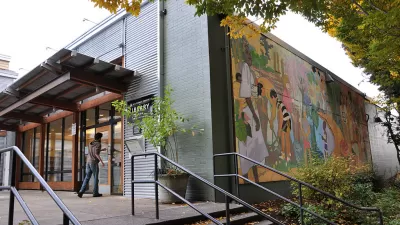"No one other than we as planners has the responsibility for decisions today that will profoundly affect others," says Attorney/Planner Dwight H. Merriam.
Dwight Merriam, a Connecticut land use attorney and planner and former president of the American Institute of Certified Planners, in a lecture at the Edward J. Bloustein School of Planning and Public Policy, at Rutgers in New Brunswick, NJ, emphasized that both social equity and the welfare of future generations must be at the core of planning practice.
The planner's clients, Merriam said, "are the poor, they are the disenfranchised, they are people who live far away but wish to be our neighbors, they are the old, they are the young, they are the people working two and three jobs who have no time to go to public hearings or run a blog, they are the people who need our help in processing and applying complex information, they are the generations not yet born, they are the people who will live on this earth 50 years and 100 years and 200 years and 500 years from now."
"When you save a sole-source aquifer," Merriam maintained, "when you preserve a critical habitat, when you make it possible for dense mixed-use development along public transit corridors that gets people out of their cars . . . and when you plan and regulate in a way that keeps our foundry worker's family from being destroyed and makes it possible for children [from low-income families] to live where they want to live and to get the education they so desperately seek and deserve, then, I say to you, you have begun to do your job as a planner."
The lecture is available as both a PDF and a podcast.
Thanks to Stuart Meck, FAICP/PP
FULL STORY: Dwight Merriam, attorney, to present annual Isadore Candeub Memorial Lecture in Planning

Pennsylvania Mall Conversion Bill Passes House
If passed, the bill would promote the adaptive reuse of defunct commercial buildings.

Planning for Accessibility: Proximity is More Important than Mobility
Accessibility-based planning minimizes the distance that people must travel to reach desired services and activities. Measured this way, increased density can provide more total benefits than increased speeds.

World's Largest Wildlife Overpass In the Works in Los Angeles County
Caltrans will soon close half of the 101 Freeway in order to continue construction of the Wallis Annenberg Wildlife Crossing near Agoura Hills in Los Angeles County.

Eviction Looms for Low-Income Tenants as Rent Debt Rises
Nonprofit housing operators across the country face almost $10 billion in rent debt.

Brightline West Breaks Ground
The high-speed rail line will link Las Vegas and the Los Angeles area.

Colorado Bans No-Fault Evictions
In most cases, landlords must provide a just cause for evicting tenants.
City of Costa Mesa
Licking County
Barrett Planning Group LLC
HUD's Office of Policy Development and Research
Mpact Transit + Community
HUD's Office of Policy Development and Research
Tufts University, Department of Urban and Environmental Policy & Planning
City of Universal City TX
ULI Northwest Arkansas
Urban Design for Planners 1: Software Tools
This six-course series explores essential urban design concepts using open source software and equips planners with the tools they need to participate fully in the urban design process.
Planning for Universal Design
Learn the tools for implementing Universal Design in planning regulations.


























